
10 minute read
Creative writing
Creative Writing From Crumlin to CarrigstownEileen Casey profiles poet Pauline Fayne
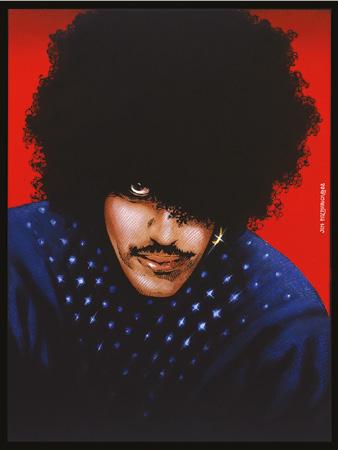

In the year of super rock star Philip Lynott’s 35th anniversary (20th August – 4th January, 1986), it’s appropriate to highlight a Crumlin born poet who drew inspiration from Lynott ‘running past our house’, even before he reached the dizzying heights of stardom. So much has been written about Lynott’s descent into ill health and his eventual passing as a result of addiction. However, it’s quite disarming to meet the young man who flashed his ‘brilliant smile/At the cameraman/Striding towards stardom’.
The cameraman, as it happens, is none other than poetry stalwart Michael O’Flanagan, an unsung hero who has done much for poetry over the years (his broadsheet Riposte helped many a fledgling writer into print and revived a traditional printing form in the process). Thanks to Michael, some rare footage exists which showcases the early talent of Lynott when he was part of ‘The Black Eagles’. Cue Pauline Fayne, one of those ‘Giggling teens/In ‘budgie’ jackets/Trip Hazard flares/And high wedge heels’.
While Lynott was forging a national and subsequently an international career with Thin Lizzy, (their 1973 hit ‘Whiskey in the Jar’ rocketed to number one in the UK charts), Pauline was living her life, marrying husband Terry and settling down in Tallaght, at the foothills of the Dublin Mountains. Although Lynott was born in Hallam Hospital, West Bromwich, England, he grew up in Crumlin with his Irish mother, Philomena. While writing poetry began at an early age for Pauline, Lynott was no stranger himself to lyrical expression. His first book of poetry, Songs for While I’m Away, was published in 1974. 21 poems, all but one, featuring the lyrics from Thin Lizzy songs is now a collector’s treasure. Only 1,000 copies of that first edition were printed in total. Although a second volume was issued in 1997, both books were brought together in a single volume, again titled Songs for While I’m Away. This second print features illustrations by Tim Booth and Jim Fitzpatrick, the latter very generously granting permission to reproduce some of his artwork here. Serendipity is a marvel, I sometimes think. As Pauline watched that film, wishing she’d been in her garden that particular day, ‘Shyly waving among the wallflowers’, a poem was born. Such are the seeds that blossom into the poetic life. It’s also good to have a mentor, a guiding light. In Pauline’s case, it was her mother’s diligence in showing her young daughter clippings from newspapers of poems written by Pauline’s grandfather Cathal Lally. At sixteen, Pauline sent a poem about the women of Moore Street into the Evening Press and they kindly included it in their letters page. It would be fair to say that Pauline mostly writes about working class life, though not exclusively. In her early twenties she joined a Writers Workshop organised by national treasure Dermot Bolger in The Grapevine Arts Centre on North Great Georges Street and around about then, she began her yearly visit to Listowel Writers Week Festival. This annual pilgrimage is also a casualty of Covid-19 although in fairness, online events go some way towards redress. Still, it’s not the same, she’s the first to agree.
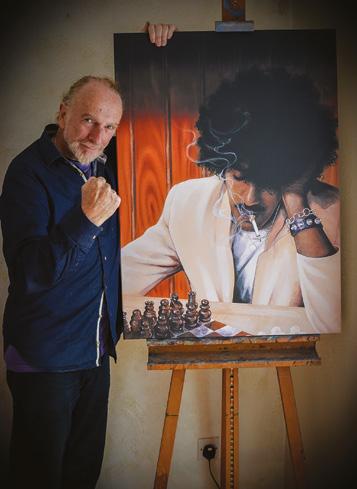
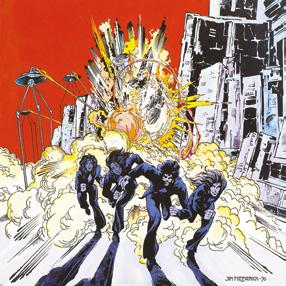
Jim Fitzpatrick in his studio working on one of his many portraits of Phil Lynott
I ask Pauline what growing up in Crumlin was like. She remembers it as being ‘a very community centred experience. Our neighbours were very much involved in each others lives, in good times and hard.’ A bit like Carrigstown I interject, referring to Pauline’s very enjoyable stint as an Extra in the hit soap. Pre-Lockdown of course. She really enjoys the buzz of being around a popular show. ‘Everyone’s extremely nice and respectful. There are no divas, just ordinary people from different backgrounds earning a living.’ Pauline joined Extras.ie when she retired. ‘You pay an annual fee and are included on their database with your photograph. They supply the extras for Fair City and other T.V. programmes as well as film. Her favourite Fair City characters are Bela and Cass, closely followed by Sharon and Anto. The last few programmes she worked on were Normal People (‘my trademark white hair makes an appearance in one scene’), Cold Comfort and the new comedy on Channel Four, Frank of Ireland. ‘There’s a lot of sitting around, waiting to be called!’ I wonder what she thinks of the current controversy surrounding a new character Father Liam and his connection to Hayley and ex-lover Ger? ‘Well, it’s a sign of good drama if a storyline evokes a strong emotional response in viewers.’
But to return to the topography of Crumlin. ‘Part of the road we grew up in consisted of cottages. There was a pig farm among them and a lot of people grew their own vegetables.’ Sounds like it was the best of both worlds, surroundings both rural and urban. She has vivid memories of being ‘chased from the surrounding fields by Mr Mooney – as have many Crumlin people!’ In the 80s in Tallaght, which was a place still very much under construction, one of Pauline’s first port of calls was The Women’s Centre in Tallaght Village. ‘It was a welcoming space that offered classes in a variety of subjects and was a place you could just drop into for a cup of tea and a chat.’ The Centre turned out to be a haven. ‘One day I suggested that I could run a writer’s group if there was anyone interested.’ And so, The Clothesline Writers Group were formed, meeting every Friday for several years. Those small sparks soon fanned the flames of a greater ambition. When the Centre closed its doors, a local arts group, Alternative Entertainments, based in Tymon Bawn Community Centre, invited Pauline to assist them in forming an an nual Tallaght Writers Seminar. It was a successful, much looked forward to week of unforgettable moments, which include workshops and readings by writers such as Eavan Boland, Nell McCafferty. Pauline remembers Nell ‘accompanying us to the Jobstown Inn for a night of hilarity and walking through Tallaght, deep in conversation with Rita Anne Higgins’. The sight of Michael Hartnett, with mischief in his eyes, advising his taxi driver to keep going past the venue of his poetry reading still resonates.
Where there’s life, there’s joy, celebration and hope. Yet, too, there’s the darker moments. Teri Murray (Pauline’s collaborative partner in A Childhood Unshared) passed away. Not only was Teri a partner in poetry but she was a dear friend, a friendship began in those Friday morning sessions. When they realised that they had both grown up in Crumlin, had similar experiences and even knew the same people, they felt they just had to collaborate. Poignantly, A Childhood Unshared is Teri’s last published work, a poet of spirit and amazing visceral qualities. Having common themes and experiences doesn’t necessarily mean the resulting poems are similar. Two very different personalities result in a different set of perspectives, which is why some collaborations work well. Pauline is no stranger to ill health herself. Three years ago she was ill with bacterial meningitis and sepsis. As a result she’s lost some of her long term memories and has short term memory problems. She also became sensitive to light and noise. ‘Day to day life during lockdown has been very fulfilling in many ways for me. Lockdown has helped, in the sense that it’s become normal to avoid crowded places and life has been quieter – less traffic, more birdsong!’
A selection of Jim Fitzpatrick works for Phil Lynott albums

In the absence of preordained subject material, I wonder what brings Pauline to the blank page and if she’s a write every day type of writer? ‘I’m very much a splurge writer. There’s always paper and pen near me – some in every coat and handbag, so I end up finding random ideas in the strangest places and at the oddest times! Ultimately, it’s the need to communicate and connect to others that bring her to write; ‘To attempt to understand the world around us.’ Like a lot of writers, Pauline feels that she ‘communicates better through the written word than in conversation.’ Her advice to writers is to ‘read twice as much as you write and take every opportunity presented to meet other writers.’ Has she a dedicated writing space? ‘Not yet, but I’m hoping to convert our small box room into a study and that’s shaping up. Terry’s retired now so there’s no excuse’.
Pauline spends many hours on genealogy sites tracing family history as far back as she can. In some cases, she’s managed to make contact (and been contacted in turn by distant cousins). ‘Many of them have a fascinating tale to tell’. At the moment she’s working on a sequence of poems based around her family history and her interest in genealogy. She’s also working towards a collaborative family memoir with one of her cousins. Pauline and Terry have five grown up children, two sons and three daughters, and two grandchildren. Terry is involved in Tallaght Athletics Club as he has been running since his teens. ‘We are now in that lovely stage of life where the children are all settled in their own homes. We look forward to a great family get-together once lockdown has lifted.’
On the subject of growing older, Pauline agrees with American activist Maggie Kuhn, ‘old age is not a disease, it is strength and survivorship.’ Again, with her interest in genealogy in mind, Pauline recommends using old photographs as a starting point for a story or poem. ‘It could be an old family photo, one you have borrowed from someone else or one found online. Imagine what happened immediately before the photograph was taken or immediately after. Are those smiles real or posed?’ And for the record, she DID see Phil Lynott and Thin Lizzy when they were at the height of their powers. Another memory (this time at The National Stadium) for another poem?
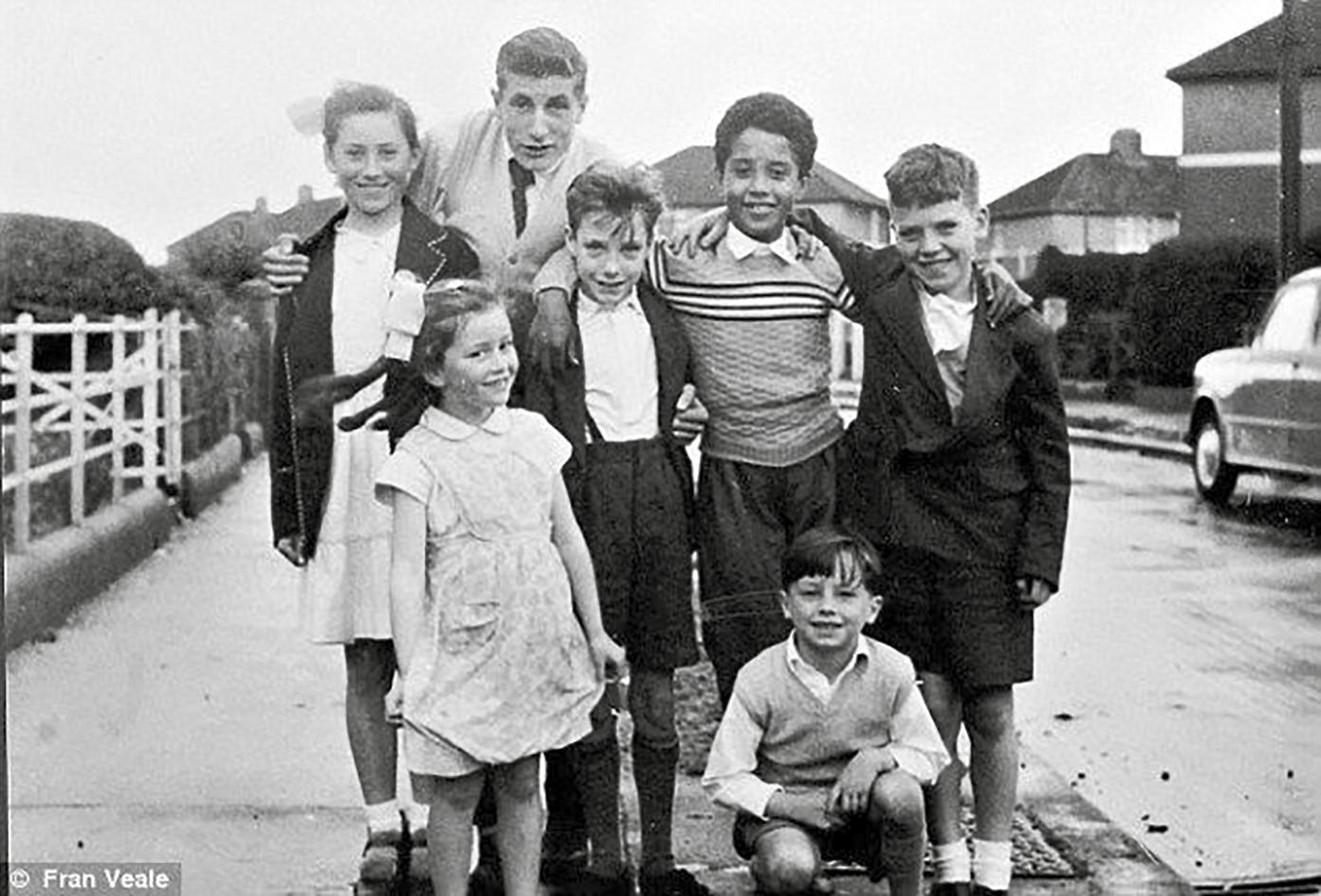
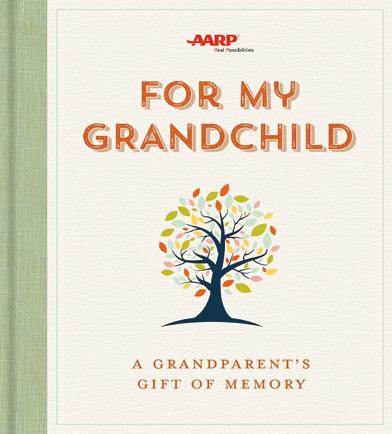
Philo
By Pauline Fayne
Giggling teens In ‘budgie’ jackets Trip hazard flares And high wedge heels
We admired the daring Of the graffiti artist Who sprayed your name Along the village walls
Hoped to meet you
At the Star Cinema or Fusco’s chipper, Swore the Black Eagles Would be world famous soon.
Today I watched again that film Of you running past our house, Chasing your dreams down Somerville Avenue And wished I had been in the garden
Shyly waving among the wallflowers As you flashed your brilliant smile At the cameraman, Striding towards stardom.
(from A Childhood Unshared)
Which brings me nicely to a book I discovered recently. While out walking, I fell into step with a friend and couldn’t help noticing the wad of colourful photocopied sheets in her shopping bag. It turned out she has kept herself very busy during lockdown by putting together a family memoir for a granddaughter on the other side of the world. For my Grandchild, A Grandparent’s Gift of Memory is a beautiful hardback edition, brim full of prompts and triggers which will ensure that family history becomes the priceless heirloom it is.
The book can be written into directly or photocopied for multiple uses. For My Grandchild: A Grandparent’s Gift of Memory is available from Lark Crafts (ISBN139781454927099) at a remarkable price of £15.
A Childhood Unshared (Teri Murray, Pauline Fayne) is available from Amazon.










